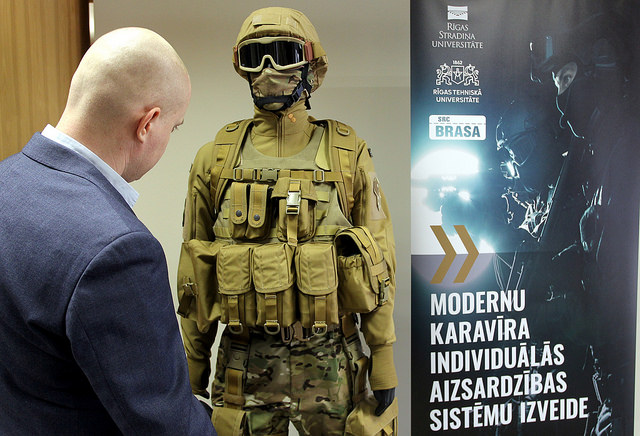The main directions of the foreign policy of Latvia are closely related to national security issues during active participation in the activities of structural units of the North Atlantic Treaty Organisation (NATO) and European Union (EU). They stipulate the continuation of close and active transatlantic dialogue and promote the strengthening of strategic cooperation between Latvia and USA. Simultaneously, Latvia attributes importance also to the establishment of partner relations with the countries of Northern Europe, Eastern Europe and Central Asia.
Comprehensive Defence
The aim of national comprehensive defence concept is to deepen the state's cooperation between all institutions, ensure effective public and private partnership mechanism development, increase the public's awareness of how to defend themselves, their families and Latvia as well as to create an self-organization tools in case of crisis.
In response to the changing security challenges, the Latvian State Protection System should be comprehensive and based on a whole-society and state institution readiness to overcome a crisis situation as well as to remain resilient against external influences. The Ministry of Defence therefore calls for the development of a national defence system which includes not only public defence areas or public administration bodies but also representatives of the private sector, companies, non-governmental organisations, citizens and other persons.
The State Defence Concept
In accordance with Article 29 of the National Security Law, the Ministry of Defence prepares the State Defence Concept (SDC). The SDC is a policy planning document that has been prepared on the basis of the Military Threat Analysis. The policy sets out the strategic goals, basic principles, priorities and measures of the country's military defence in times of peace, threat to the state and war. In accordance with the National Security Law of the state, the SDC drafted by the Ministry of Defence shall be reviewed by the Cabinet of Ministers and approved by the Saeima at least once in each parliamentary term - by 1 October of the second year of its activities.
On the basis of the SDC, a national Defence Policy is implemented and specific national defence policy and operational measures are planned. Similarly, the resources needed to implement defence policies and measures, the development of the National Armed Forces (NBS), the necessary preparedness and functioning of public authorities and governmental bodies, local governments, natural and legal persons during peace, state threats and war are planned in accordance with the SDC. The implementation of national protection measures shall be ensured according to the resources available in the performance of the statutory functions and tasks of the NBS. The introduction of the SDC shall be ensured by the national authorities in accordance with their competence and with the tasks specified in regulatory enactments.
On 5 October 2023, the Saeima approved the State Defence Concept developed by the Ministry of Defence, which defines the strategic principles, priorities and measures of the country's military defence in times of peace, national threat and war. The SDC includes two main strategic lines of action for national defence: strengthening deterrence and defence capabilities, and strengthening resilience, capacity and will to defend the country.

International Cooperation
The Ministry of Defence ensures very close industry cooperation among the Baltic States, with Latvia's strategic partners the USA and Canada, the lead country of the NATO Multinational Brigade in Latvia, and the Nordic countries, in particular Denmark, which co-leads the Multinational Division Headquarters "North" with Latvia. At the same time, Latvia receives very substantial military support from several European countries, such as Spain, Italy, Poland, the Czech Republic, Slovakia, Slovenia, Albania, Montenegro, North Macedonia, Iceland, Germany, the United Kingdom, Finland, Sweden, etc.
Public Involvement
The Ministry of Defence (MoD) is open for cooperation with civil society and invites non-governmental sector to actively participate in the policy planning and implementation processes of state administration.
The MoD has established a regular cooperation with the non-governmental sector in Latvia and abroad.
Cybersecurity
The aim of cybersecurity policy is a safe and secure cyberspace, where the safe, reliable and uninterrupted provision of essential services to government and society is guaranteed.
Logistics and Defence Investments policy
A NATO-compliant and development-oriented defence supply policy ensures successful international cooperation, economic growth and the involvement of local entrepreneurs in maintaining, supporting and providing capabilities of the National Armed Forces.
Scientific research
Scientific research activities are subordinated to the core mission of the defence sector - to provide the necessary military force to guarantee the sovereignty, territorial integrity and security of the Latvian state.

Environmental protection
Environmental protection has always been a focus of the Ministry of Defence (MoD). As early as 1999, experts from the MoD and the National Armed Forces (NAF) developed the first MoD and NAF Environmental Protection Strategy and Action Plan to achieve the objectives set out in the Strategy.
In 2023, a new MoD Environmental Policy and MoD Environmental Guidelines 2023-2027 were approved.
Permission to alienate real estate in the protection zone of a national defence object
In 20 January 2022, the Protection Zone Law came into force denoting that owners, who want to alienate real estate or a part of it (as well as the supposed part) that is completely or partially in the protected area of around a national defence facility, as well as to being any kind of construction work (including creation of temporary buildings) must receive the consent of the Ministry of Defence to the alienation of immovable property to a specific person in order to prevent an impact threatening or potentially endangering national security on the object of national defence.
In order to obtain the aforementioned consent, the owner of the real estate must contact the Ministry of Defence and submit an application indicating the name of the immovable property and the address of the immovable property object, if any, the cadastral number and the person (name, surname or title and personal identification code or registration number) to whom the immovable property is planned to be alienated.
